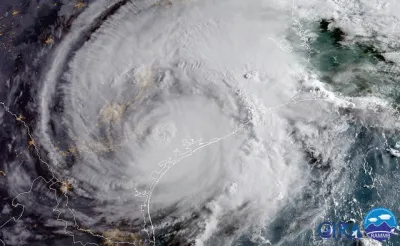One need not be on the Gulf Coast to experience some of the effects of Hurricane Harvey, a category 4 storm that landed near Corpus Christi on Friday night. Gas prices are expected to rise five to ten cents per gallon in some regions, then recede.

With many Gulf Coast refineries shuttered in advance of the category 4 Hurricane Harvey's landfall on Friday evening between Port Aransas and Port O'Connor, Texas, motorists should expect to see some price increases at the gas pump, with most experts suggesting it would be from a nickel to 15 cents.
"About one-third of the nation's gasoline refining capacity is located in the Gulf Coast region," reports Nathan Bomey, business reporter for USA TODAY (although Reuters put it at "more than 45 percent.").
But prices will quickly recede after a temporary spike, said Tom Kloza, global energy analyst with Oil Price Information Services, as kids go back to school and heavy travel subsides.
The U.S. has plenty of gasoline in storage, but the issue would be whether flooding impacts the ability of refiners to both move out finished gasoline and bring in crude oil. If key refining operations are flooded, it could take months to restore service.
"Kloza said if refineries are knocked out, then prices could spike sharply, but it could take time to know if there is serious damage," reports Patti Domm, CNBC Markets Editor. However, he adds that the local price increases will be mitigated by state laws that prevent gouging.
You'll start seeing it this weekend. The people that will also feel the brunt are consumers in the mid-Atlantic and Southeast that are being supplied by gasoline from the Colonial pipeline, as well as some markets in the Midwest that are receiving Gulf Coast supplies," said Andrew Lipow, president of Lipow Oil Associates.
The national average Friday was $2.35 per gallon for unleaded regular, according to AAA. On Saturday, they were up only a penny.
Oil production shut down
Harvey also affected the nation's oil production in the Gulf well before landfall, reports Irina Slav for OilPrice.com on Aug. 24, on drilling operations that closed down before Friday.
About 17 percent of U.S. crude oil output comes from the Gulf of Mexico, or 1.661 million bpd as of May, according to the Energy Information Administration.
Some of Harvey's expected effects on the Gulf's population and economy were posted here on Saturday.
FULL STORY: Gas prices at risk of rising as Hurricane Harvey bears down

National Parks Layoffs Will Cause Communities to Lose Billions
Thousands of essential park workers were laid off this week, just before the busy spring break season.

Retro-silient?: America’s First “Eco-burb,” The Woodlands Turns 50
A master-planned community north of Houston offers lessons on green infrastructure and resilient design, but falls short of its founder’s lofty affordability and walkability goals.

Delivering for America Plan Will Downgrade Mail Service in at Least 49.5 Percent of Zip Codes
Republican and Democrat lawmakers criticize the plan for its disproportionate negative impact on rural communities.

Test News Post 1
This is a summary

Test News Headline 46
Test for the image on the front page.

Balancing Bombs and Butterflies: How the National Guard Protects a Rare Species
The National Guard at Fort Indiantown Gap uses GIS technology and land management strategies to balance military training with conservation efforts, ensuring the survival of the rare eastern regal fritillary butterfly.
Urban Design for Planners 1: Software Tools
This six-course series explores essential urban design concepts using open source software and equips planners with the tools they need to participate fully in the urban design process.
Planning for Universal Design
Learn the tools for implementing Universal Design in planning regulations.
EMC Planning Group, Inc.
Planetizen
Planetizen
Mpact (formerly Rail~Volution)
Great Falls Development Authority, Inc.
HUDs Office of Policy Development and Research
NYU Wagner Graduate School of Public Service


























